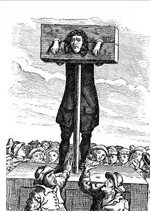As controversial as this view may be, I urge great caution in lobbying for the currently proposed national public – public! – register of convicted child sex offenders – whom I abhor as much as everyone.
We should be deeply uneasy with the proposal’s disregard for the fact that not all those convicted of sexual child abuse are guilty, just as not all those convicted of murder and other serious crimes are guilty.
My research over the past seven years has made it clear that miscarriages of justice are a reality of our criminal justice system – all over Australia, across all categories of serious crime – and not least with cases of child sexual abuse.
One of the cases I have investigated over that time and reported on my website provides a relevant example of a wrongfully convicted child sex abuser. I have interviewed him and his supportive wife several times and examined the 70 page petition for a review (refused without explanation by the Attorney General) that a lawyer prepared for him pro bono that deconstructs the case and shows how his conviction is an egregious miscarriage of justice. While in jail, he met several other men with similar convictions – and similar stories of injustice. His (wrongful) conviction has totally ruined his life. He is already listed as a sex offender with the police and he and his wife live in fear of being identified in their neighbourhood.
Here is one of my reports on him
The proposed register (funded by $7.8 million in the 2019/20 budget) would allow Australians to see names, aliases and photographs (plotted on a map) of thousands of paedophiles, as well as their date of birth, physical description and the “general location and nature” of their crimes. It would expose not just the real pedophiles but also the wrongly convicted men to the possibility of further and egregious injustice – and possibly harm. This potential collateral damage is unconscionable.
 A public register is something of an encouragement to vigilantism, a kind of stocks in the public square. Supporters of the public register claim it would ensure the safety of vulnerable children. How exactly?
A public register is something of an encouragement to vigilantism, a kind of stocks in the public square. Supporters of the public register claim it would ensure the safety of vulnerable children. How exactly?
Would a public register of rapists follow? Violent bank robbers? Con artists? Burglars? Convicted drug dealers? Terrorists?
There is a better way: the child sex offenders disclosure scheme in the UK enables parents, guardians and third parties to enquire whether a particular person who has access to a child is a registered sex offender, or poses a risk to that child.
The police maintain child sex abuse registers and monitor the offenders. It’s their professional task. It’s not neighbours’ task. The police make unannounced random visits to their homes, checking computers, phones, etc, such as my interview subject, for whom (and their wives) this is an ongoing trauma.
To publicly name, shame and locate convicted pedophiles (in addition to any media coverage of their conviction) might be emotionally attractive, but in my view it is a dangerous and misconceived objective. What would parents do armed with the name and address of convicted and penalised pedophiles to safeguard their children? Would they know whether the pedophile in their midst is justly or wrongfully convicted? The hidden threat – unconvicted, predatory pedophiles – would not show up on this register.
I argued against a publicly accessible register (name/address/photo) when the Justice Party agitated for one in 2018.
Others are also concerned. A national public register of child sex offenders in Australia would be a “massive disaster” by bringing a false sense of security and possibly identify victims, says Griffith University criminologist Danielle Harris.
Andrew L. Urban is the author of Murder by the Prosecution (Wilkinson Publishing) and blogs at wrongfulconvictionsreport.org
